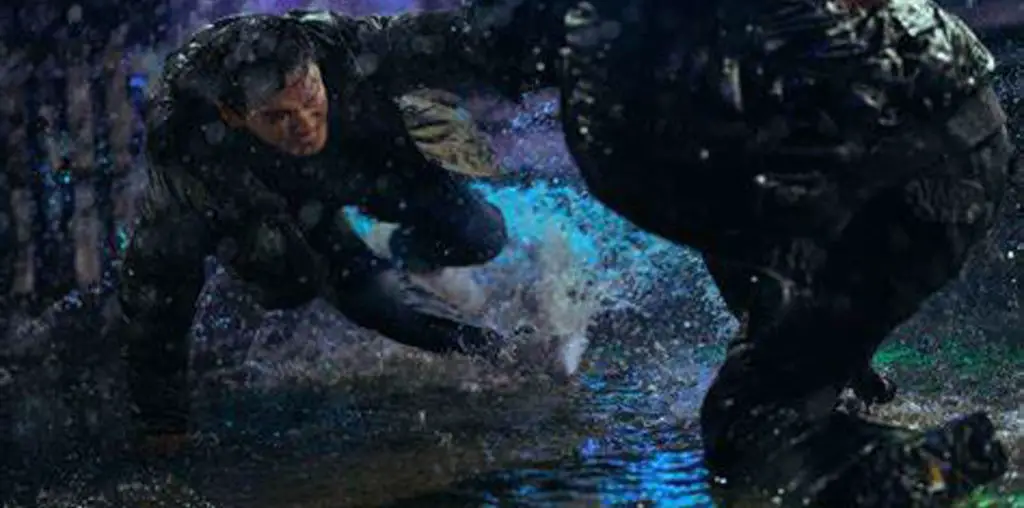
In Brett William Mauser’s feature film, The Green Conspiracy, the year is 2022, and the United States is far different from the world we know. After a nuclear attack on seven cities in 2012, the U.S. splintered into anarchy, resulting in a nine year war between Texas and California over precious resources. During this time, the U.S. government merged with various corporations, becoming the Corporate States of America instead. In 2018, the Corporate States, in an effort to curb global warming under the belief that humans are the prime creators of greenhouse gases, began having “Green Lotteries,” whereupon random citizens would be chosen for death to keep the population, and carbon emissions, under control.
Still with me? That’s roughly the information you get after a text crawl in the first minute or so of the film. If it’s a lot to digest, that’s one of the primary issues with the film: it throws a lot of information at you before twisting it all up in the name of intrigue and mystery. Within the first few minutes, you’re either into the overall tone and story, or your mind has already started to check out. Unfortunately, if you’re of the latter camp, the film doesn’t really bring you back in.
After the crawl, the film sets into the rest of the actual story, which essentially involves the corruption of the Green Lottery system, whereupon political opponents and corporate enemies find themselves not-so-randomly selected for death. Additionally, the entire system may not even be necessary, as scientific data seems to be suggesting that humans don’t actually have much to do with the global warming problem. Wrapped up in the conspiracy is a Green Agent, Isabella Montoya (Amy Jordan), whose most recent death warrant services are under the investigation of some police detectives interested in uncovering corporate corruption.
Isabella is more than just a Green Agent, however, she’s also a sleeper agent for the state of California, which runs her afoul of another Green Agent, Agent Glass (Will Scoville), and his band of cybernetically-enhanced henchwomen. Isabella is assisted, however, by the mysterious Kenji (Lazumasa Yokoyama), who seems to always be there to save her a*s, but also seemingly knows more than anyone what’s actually going on.
Which is more than I can say for myself. As I said, the opening crawl alone primes the brain for info-overload, and as the film rolls along, it seemed to be far more interested in corporate and government conspiracies than in anything else. The result is that, as an audience, you never connect to any of the characters. If you don’t connect to the characters, and the story is overly convoluted, it’s hard to care about any of it.
That said, I give the film credit for its visual effects work. It’s obvious that the film is working within some budgetary constraints that the bigger boys don’t have to worry about, and it makes the best of what it has. Sure, I wouldn’t have minded more practical effects, but it’s hard to argue with the alleviated safety concerns or control over the image when effects such as gunshots are done digitally. Considering the other layered in effects-work, it fits in with the visual precedent set by the film.
Unfortunately, however, the visual effects are but one component. The story, for me, worked more in numbing my brain than engaging it, and the characters didn’t have much going for them than to throw more conspiracy gibberish my way. Even Isabella, who is given the most character to work with, in the end, didn’t garner much interest. I think, overall, ambition on the page got the best of entertainment on the screen.
Some might think this sounds like I just want the film dumbed-down, or at least it would’ve been easier to digest if it wasn’t so complicated or challenging. That’s not what I’m saying; I think you can keep the story and characters exactly as they are, but if you do, this is probably not the best medium for the message. This would’ve worked as a comic book series or even a novel more so than it does a ninety-something minute movie.
This film was submitted for review through our Submission for Review system. If you have a film you’d like us to see, and we aren’t already looking into it on our own, you too can utilize this service.
